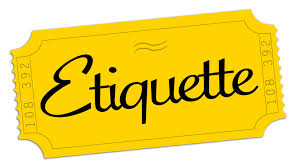记忆方法
1. ticket => etiquette.
2. 该词原指“标签”,“签条”。其实英语单词 ticket (票,标签) 亦源于此。因为法国以前在宫廷盛宴时会发给宾客一张称为 etiquette 的纸张或卡片,上面写着应遵循的各种礼节、礼仪,由此后来就转指、引申为:礼节、礼仪。
2. 该词原指“标签”,“签条”。其实英语单词 ticket (票,标签) 亦源于此。因为法国以前在宫廷盛宴时会发给宾客一张称为 etiquette 的纸张或卡片,上面写着应遵循的各种礼节、礼仪,由此后来就转指、引申为:礼节、礼仪。
中文词源
etiquette 礼仪
词源同stick, 小木棍,粘,连。原义为粘贴的小卡片,来自法国路易十四时期,给大臣发一张写上注意事项的小卡片,以提醒需要注意的行为和举止。参照同源词ticket.
英语词源
- etiquette
-
etiquette: [18] Etiquette is, almost literally, ‘just the ticket’. The primary meanings of French étiquette are ‘ticket’ and ‘label’ – and indeed it is the source of English ticket. A particular application of it in former times was to a small card which had written or printed on it directions as to how to behave properly at court – hence it came to mean ‘prescribed code of social behaviour’.
=> ticket - etiquette (n.)
- 1750, from French étiquette "prescribed behavior," from Old French estiquette "label, ticket" (see ticket (n.)).
The sense development in French perhaps is from small cards written or printed with instructions for how to behave properly at court (compare Italian etichetta, Spanish etiqueta), and/or from behavior instructions written on a soldier's billet for lodgings (the main sense of the Old French word).
权威例句
- 1. lessons for young ladies in deportment and etiquette
- 年轻女士的礼仪课
- 2. She's a real stickler for etiquette, so you'd better ask her advice.
- 她非常讲求礼节, 所以你最好问她的意见.
- 3. The rules of etiquette are not so strict nowadays.
- 如今的礼仪规则已不那么严格了.
- 4. This would be against diplomatic etiquette.
- 这将在外交上犯失礼的错误.
- 5. Helen : Today's new word is etiquette – E . T . I. Q . U . E . T . T . E . – etiquette.
- Jean:Etiquette. 如今我们很少听说这词语,它非常特别,可以解释一下吗?

